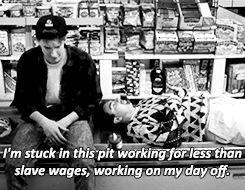Marxism fails because Marx was wrong about a lot of things, as I said earlier he got a lot of his math and theory wrong in the long run because the world did not turn out the way he anticipated it would so basically his economic arguments have all been made redundant as I understand it, but I thought this thread was about morality not actual real world workings. I could only get through half of Capital because it's such a slog and I didn't like it but I don't remember a part of the book that called for punishment and abuse, this discussion shouldn't be based on real world anecdotes and instead actual theories of Marx and whether they're moral or immoral or more broadly how capitalism with all of its unintentional slave labor, ecological destruction and corruption is morally better or worse than the alternatives.
"Socialism" in a western context means "democratic socialism", which is just strengthening the safety net. No-one wants to run an actually fully socialist government because that would be a disaster. The "look at Venezuela" rebuttal might as well be a cliche at this point because it's just over-done and it's very misunderstood by conservative pundits. Venezuela suffers not only because of failed socialist policies but because of a corrupt and anti-intellectual government which is tearing the country apart from the inside. To say that socialism caused its problems is a cop out: look here.
"Socialism" bought Australia medicare, which for me is enough to justify Australian socialist principles. I agree that the health care cost is high but it's not a problem in a real world perspective. If our country spent less money supporting the dying coal industry (which our government politicians primarily in the Liberal party have a personal stake in) and stopped cutting tax for the rich it wouldn't be such a big issue. Not to mention spending money on stupid stuff like sending extra chaplains to schools and giving money to privately funded religious and elite colleges.
In regards to whether or not I "understand" socialism as an ideology, that's an interesting thing to say because it assumes that your understanding of an ideology is the correct or most valid one. You identify as a libertarian conservative, which somehow gives you a keener insight into a philosophy you don't subscribe to. Your view of socialism is coloured by your libertarian ideas about what socialism is, and that's different from mine.
It's important that we see and recognize the differences in the way we look at the world. We can both be right because the reality is we're probably talking about two sides of the same coin.
You are not wrong in your ideas about socialism, if socialism is looked at from a certain angle your thoughts certainly are correct. But that angle paints socialism as a kind of thievery, which is in-line with the whole "taxation is theft" stuff. The way I see socialism, or "social democracy", is that it should be regular democratic capitalism that has safety measures built in to ensure that people don't suffer unnecessarily. "Socialism" directly or indirectly bought us the union movement, a minimum wage, disability pensions, welfare assistance for those who need it, public schooling and public libraries, all of which have improved millions of lives of people world wide leading to happier and smarter people. That's not a bad thing.
I don't agree with the assertion that socialism wants to regulate society in any way that a capitalist state wouldn't. Economic regulation is not a bad thing to me, but economics is a staple arguing point between left and right thinkers.
To get my thoughts back on track communism isn't immoral because Marx approached it from the view of "what's best for the workers", the people doing the hard labor, as far as I'm aware he didn't call for punishments or any kind of brutality. If I'm wrong I'll own it and I would have learned something new. Even if it does fail economically (which I'm not debating), that doesn't make the underpinning immoral it just makes the theory flawed. I wouldn't call communism moral either because no economic theory is moral, in every economic model ever devised someone has to "win" more other people, the inverse is true too that no economic model is immoral because human decision making effects the way they're implemented which is what actually affects the real world, not the theory.
Very rarely is an ideology implemented as it was supposed to be implemented. Capitalism is no exception, the current version of capitalism is different from Wealth of Nation's principles after all because it evolved as our technology did. A "communist" example can be seen in the way China has evolved to have a hybrid capitalist economy even though it has a fascistic government (we could argue that it's not a communist government because the ruling party does not elect their leader, China is currently an autocratic government).
I think this is an instance where the truth is more complicated than saying "I'm right" or "you're wrong" because ideology isn't as simple as that, everything is a spectrum and to boil things down to absolutes is a poor way of approaching it.
I respect your views even if I don't agree with them.










 Reply With Quote
Reply With Quote